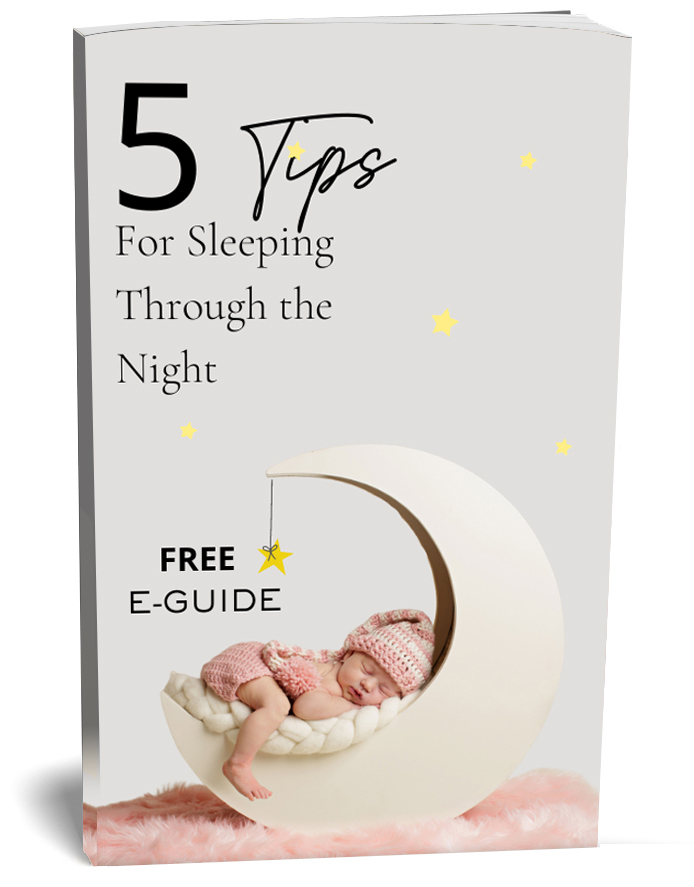You know the parents of a wakeful baby the moment you see them. Bed head. Bags under the eyes. A fourth cup of coffee in hand. A look in their eyes like they have just been subjected to a new and previously unknown form of torture.
Sadly, it’s a very common sight.
Getting a baby to sleep through the night is a common struggle for many parents — both new and seasoned.
And just when you think you have it made, your baby who has slept like an angel through the night for months can go through regressions. The waking periods can return because the baby is sick, teething, having a growth spurt, or just because it’s Tuesday.
Here are some of our top five tips to help your baby learn to sleep through the night.
Stick to a Bedtime Routine
 Babies sleep for 10 to 18 hours a day, but they don’t really know (or care) which hours those are. They don’t take their cues from the sun the way adults do, so they need Mom and Dad to provide physical clues to know it’s time for bed.
Babies sleep for 10 to 18 hours a day, but they don’t really know (or care) which hours those are. They don’t take their cues from the sun the way adults do, so they need Mom and Dad to provide physical clues to know it’s time for bed.
A consistent bedtime routine is an ideal way to do this. You may give your baby a warm bath, a gentle massage, a last bedtime feeding, a story, a lullaby, or a combination of these. These bedtime rituals are also a great chance for you to bond with your baby.
It doesn’t matter so much what you include in the routine, so long as it’s consistent and done in the same order each time. Eventually, your baby will associate these cues with bedtime and sleep.
Encourage Self-Soothing
 Learning not to flip out when stressed or upset is a learned skill for babies (as it is for adults). Self-soothing takes practice and patience for both you and your baby.
Learning not to flip out when stressed or upset is a learned skill for babies (as it is for adults). Self-soothing takes practice and patience for both you and your baby.
Teaching your baby to soothe himself back to sleep doesn’t have to mean letting him cry it out on his own all night. Leaving your baby to sleep on his own cold turkey will likely be rough on both of you. To start out, lay your baby down to sleep when he is drowsy, but not completely exhausted.
Try to resist the urge to pick up your baby every time he cries during the night. Remember that there is no other way for your baby to self-soothe than to let him try it on his own.
Create an Optimal Sleeping Environment
 Despite all the stuffed animals, blankets, crib bedding, soothies, and mobiles that are marketed to parents for the baby’s nursery, the best environment for a baby to sleep is an empty crib.
Despite all the stuffed animals, blankets, crib bedding, soothies, and mobiles that are marketed to parents for the baby’s nursery, the best environment for a baby to sleep is an empty crib.
Because the experience of seeing, hearing, and feeling are all brand new, babies are easily stimulated by things we adults find to be common place. Bright colors, patterned fabrics, mobiles, fuzzy blankets, and toys do more to distract and stimulate your baby rather than soothe her to sleep.
To give your baby the best chance for sleeping through the night, make sure her room is quiet and at a comfortable temperature. If you have other children or noises that would distract her, consider turning on a white noise machine to mask some of the noise.
If your baby is not yet rolling, consider swaddling. While loose or bulky blankets should be avoided, swaddling can help calm your baby and (according to some studies) encourage her to sleep longer and deeper. Once your baby starts to roll, swaddling should be discontinued for safety.
Play Detective
 You have completed the bedtime routine, put your baby in a quiet, empty crib, but he is still fussy and refuses to sleep. What do you try next?!?!
You have completed the bedtime routine, put your baby in a quiet, empty crib, but he is still fussy and refuses to sleep. What do you try next?!?!
Well, put on your detective hat, Sherlock. There may be darker forces afoot preventing your baby from sleeping through the night.
Use process of elimination to see what is troubling your baby. When is the last time he ate? Is his diaper dry? Has the swaddle blanket come loose? Has he lost his pacifier? Is he laying on top of something uncomfortable? Is he overtired? Or cutting a tooth? Is his foot stuck in the crib rail?
Any of these one-off things can prevent your baby from sleeping through the night.
A video baby monitor can help you in assessing the situation while not interrupting the self-soothing process.
Relax
 It’s an unfortunate truth, but many times, you can do everything right and your baby will still cry.
It’s an unfortunate truth, but many times, you can do everything right and your baby will still cry.
But relax. Take a deep breath. You will both get through this.
Remember that babies have no other way to communicate than crying. Dogs bark. Cats meow. And babies cry.
Often we hear a cry, we translate it as distress or pain when really it may the infant equivalent of Mooooom! I’m booooored!
As your baby learns to sleep through the night on her own, she will have periods of crying.
And that’s okay.
Once you make these changes, expect that it will take some time for your baby to adjust. Sleeping through the night is a learned skill for your baby, and it won’t happen in one night. Teaching your baby to self-soothe will take some trial-and-error.
Stay the course and trust that someday (even if not today), your baby will sleep through the night.
I know how frustrating and exhausting it can be when your little one is not sleeping through the night.
My methods have an almost 100% success rate with every child. I take the time to learn about your baby. Each child is different with a unique personality to take into consideration. I use all of this to help create the perfect plan for you to use to help your baby begin sleeping through the night so you can be the well-rested, energetic parent you were meant to be!
To learn more about my sleep training methods, click here.




















